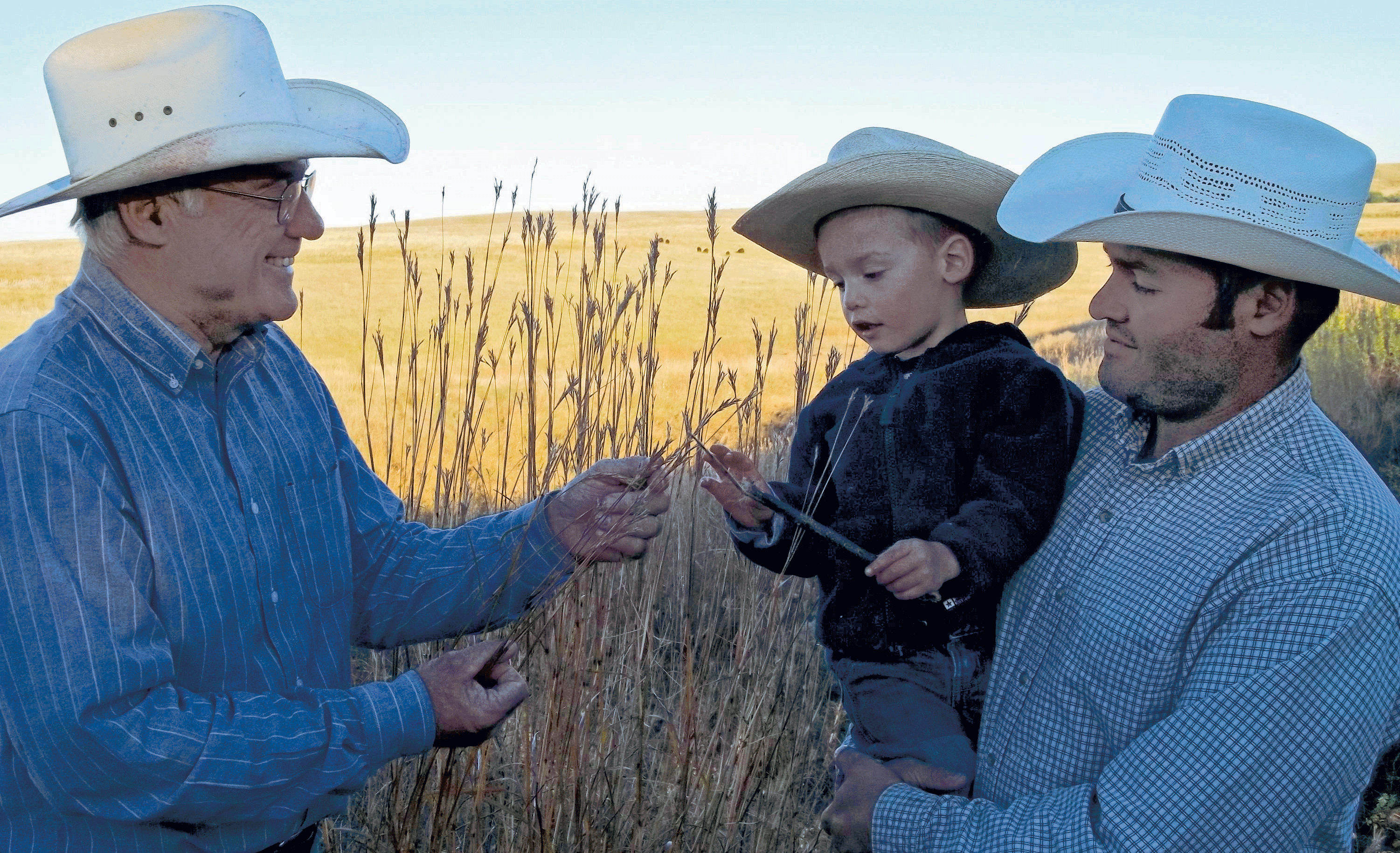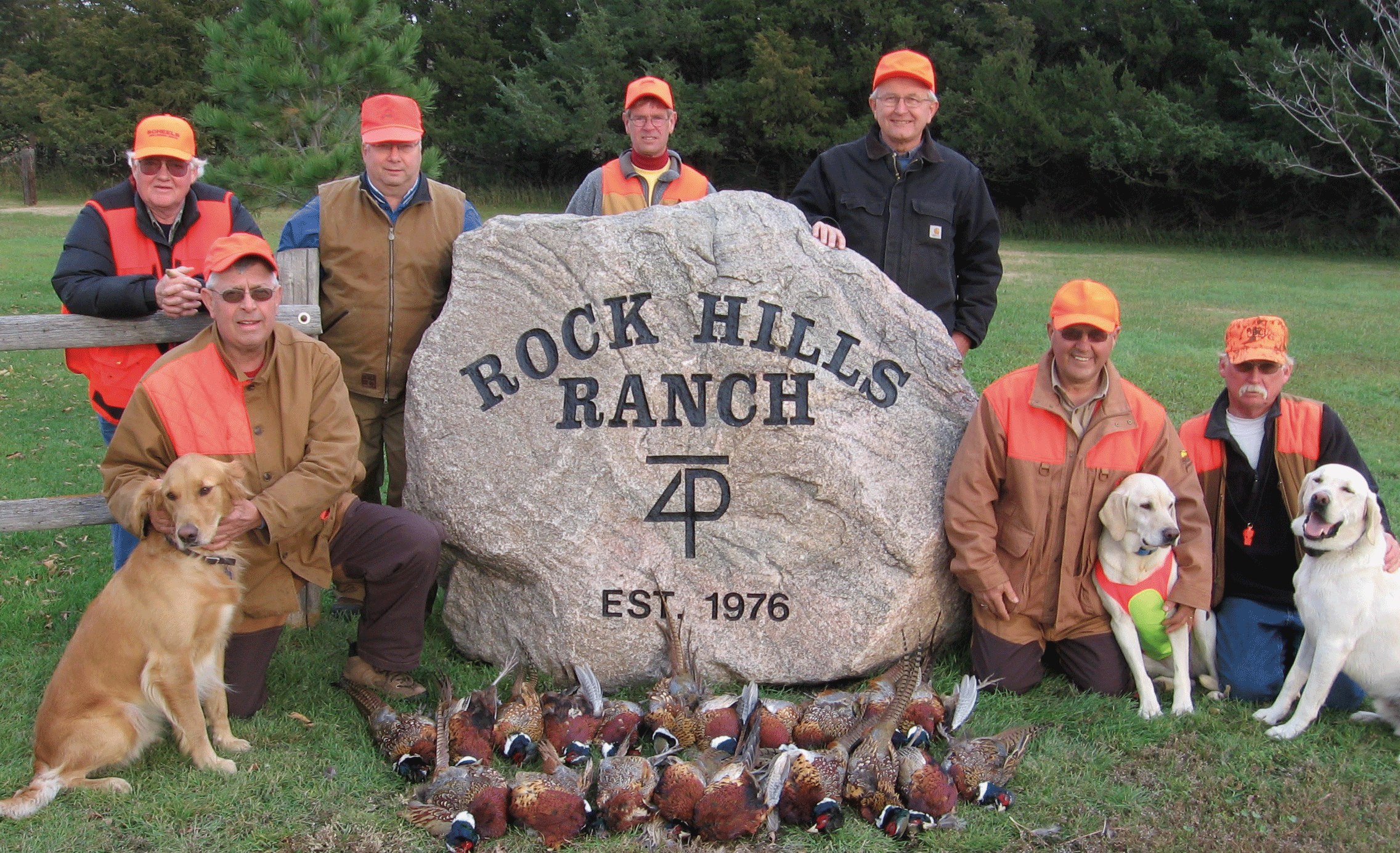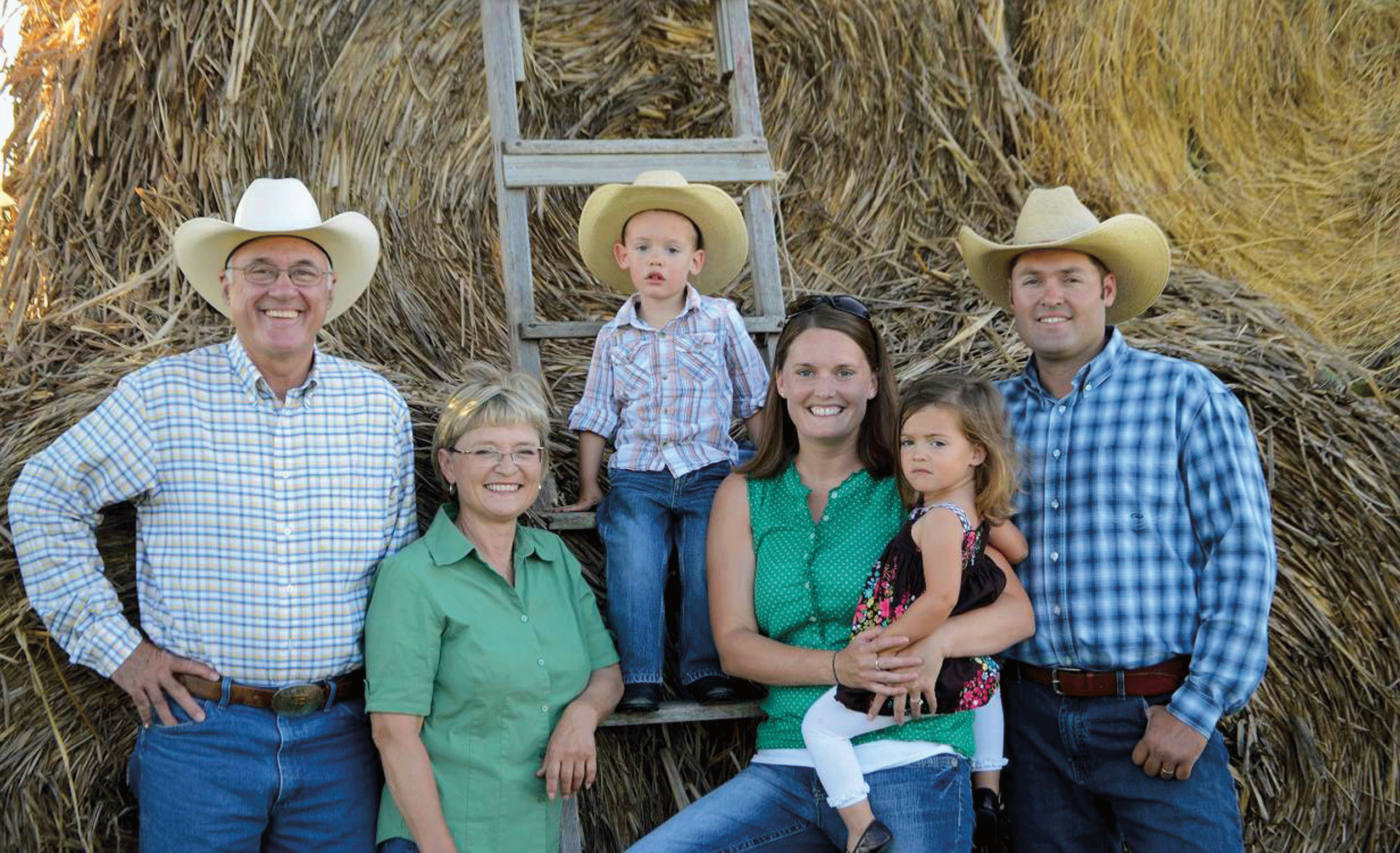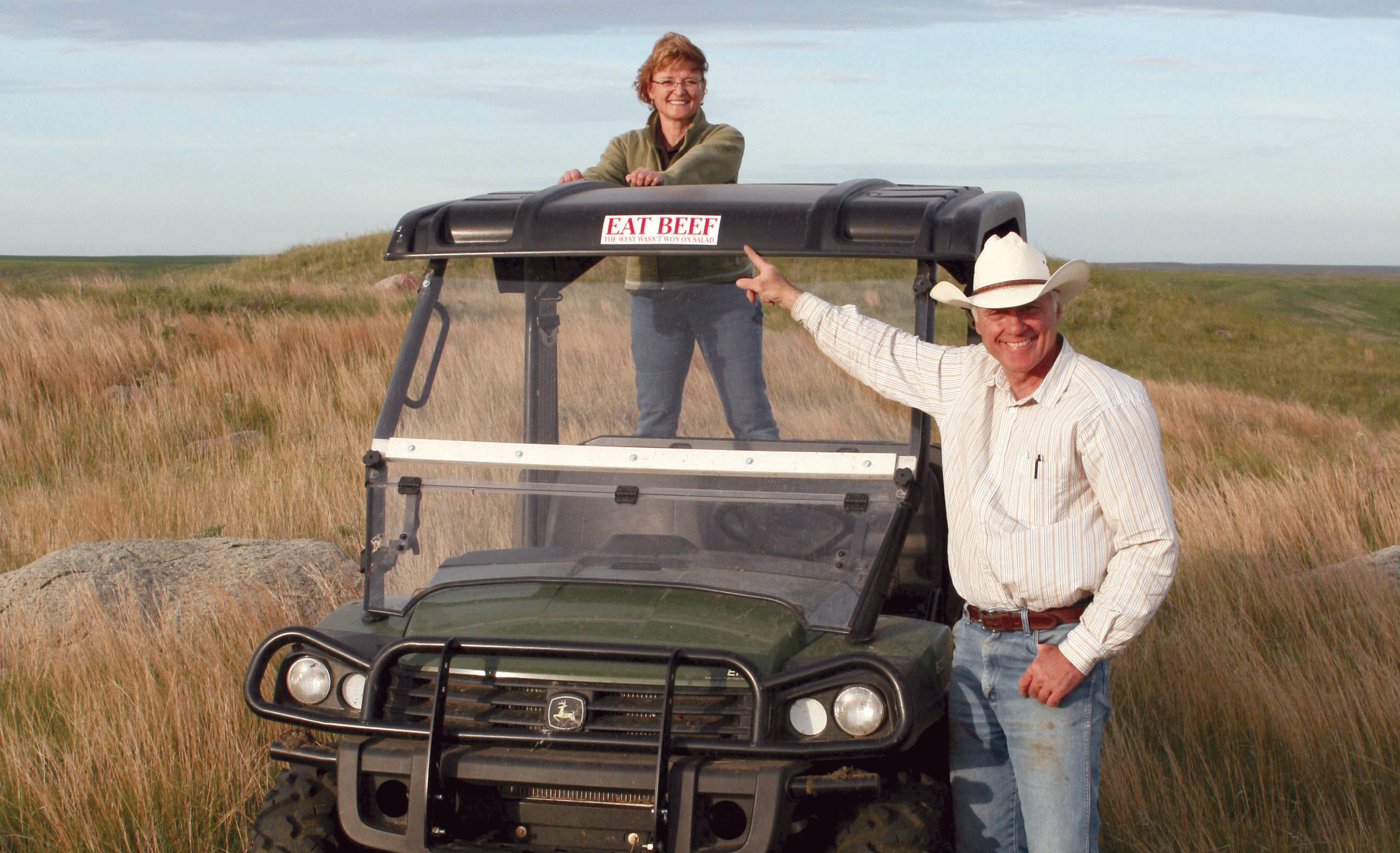Lyle Perman is someone who definitely practices what he preaches. Perman, who gives numerous talks about conservation each year, and his family were recently named the recipients of the 2014 Leopold Conservation Award by the Sand County Foundation, the South Dakota Cattlemen’s Association and the South Dakota Grassland Coalition.
In addition to the Permans, other State graduates were finalists. They were:
•   Cronin Farms of Gettysburg, a multigenerational mixed livestock and crop farm owned by Monty ’81 and Mike ’84 Cronin and their wives Nancy and Jamie.
•   Jorgenson Land and Cattle Partnership of Ideal, a fourth-generation diversified crop, livestock and hunting operation. It is owned by Bryan ’87 and Brenda ’89 Jorgensen; Cody ’97 and Abby Jorgensen; Greg ’74 and Deb Jorgensen; Martin and Mary Jorgensen, and Nicholas Jorgensen.
Perman ’77 and his family operate the Rock Hills Ranch of Lowry. Not only do the Permans have a lot of land—approximately 7,500 acres—to manage, but also a lot of water. The ranch annually receives approximately 17 inches of rain on average, producing more than 2 billion gallons of water or enough to fill 80,000 backyard swimming pools. As a result, water conservation ranks in a tie with land conservation on the ranch.
The Leopold award honors South Dakota landowner achievements in voluntary stewardship and management of natural resources. The $10,000 prize and a crystal award depicting Aldo Leopold will be presented to the Perman family at the South Dakota Cattlemen’s Association’s Annual Convention in December. The ranch was featured during a July tour.

“Our goal is not to sustain what we have, but to regenerate (the native grassland) to what it was.” —Lyle Perman
Leopold, an Iowa native, is considered by many as the father of wildlife management and of the United States’ wilderness system.
“Our goal is not to sustain what we have, but to regenerate (the native grassland) to what it was,†said Perman, whose wife, Garnet ’76, along with their son, Luke ’06, and his wife, Naomi, manage the ranch.
The Permans have focused on creating conditions for good water infiltration on the ranch. Decisions to use rotational grazing methods, adopt no-till practices and plant cover crops were made to increase the amount of water that soaks into the soil.
“Our number one goal is not to let a drop of water leave the ranch,†said Perman, who spoke on water conservation at the 2013 Plain Green Conference in Sioux Falls. “Water is extremely important. It’s the number one limiting factor in grass production on our ranch. We have plenty of sunlight and air for the plants. We tend to be greedy in terms of water. Anything that falls on the ranch, we try to capture.â€
When his family took over the Rock Hills Ranch nearly 40 years ago, Perman needed to make changes, particularly in ways to enhance water management.
“Like anything, when times change, so do management practices. Thirty-seven years ago when I graduated from college, it had been operated as a dairy and crop farm on soils that were not suited to be farmed,†Perman said. “My father (LeRoy) planted most of the tillable ground back to grass and alfalfa. The pastures were suffering from overgrazing in some areas due to season-long grazing. Most of the ranch’s tillable ground has been returned to grass and alfalfa. We’re in the process of doing the same with additional ground we’ve purchased, putting back to native grasses.
“We look at what’s above ground and below,†he continued. “To maximize infiltration, we concentrate on litter (dead plant material) on the surface. We want to have all of our ground covered and improve our organic matter to increase the ability of the soil to hold water. Increased infiltration and organic matter help make the ranch remain productive in years when rainfall is below normal.â€

A hunting party from Wisconsin pose for a photo by the Rock Hills Ranch’s sign. The group has been hunting at the ranch for several years.
Some of Lyle Perman’s actions are a result of attending SDSU. And these have been enhanced by Luke Perman’s degree in ranch science.
“I started rotational grazing when I came back from college. It’s evolved from that to the point where now we look at pasture and try to figure out how to better manage it, sometimes it requires another cross fence and the next time more water development,†Lyle said. “Some of the practices we use today have evolved. Take, for example, no-till farming or management-intensive grazing. Those were not on the radar when I was in college. What SDSU did for me was provide me with an understanding of the land and the importance of staying connected with people who can help you make better management decisions.â€
The ranch currently is home to an Angus cow-calf operation but the Permans also plant various food crops for wildlife. There is a holistic approach to the ranch’s activities.
“Whenever we look at land use, we need to look at the whole picture instead of just one item,†he said. “For example, if I have a pasture with a lot of growth, one might think I should use all of it. If I do that short-term, it might work but if I do it long-term, it will hurt the pasture. We ask ourselves ‘How does that use impact insects? Large game animals? Ground nesting birds? Do our management practices have an impact on pheasants?’ There are a lot of items to be considered when looking at land management. We see a lot of land-use managers look at what will give them the largest return in the short term, not looking at the big picture and long-term consequences for their actions.â€
The Permans also have a desire to educate others about their management practices. They recently started an intern program to provide college students hands-on experience in production agriculture. There were applicants from 33 schools in 2014. In addition, Rock Hills Ranch sponsors a Jackrabbit Guarantee Scholarship. They also host various groups for ranch tours.
In a recommendation letter for the Leopold Award, World Wildlife Fund senior program officers Jill Majerus and Nancy Labbe wrote the following:
“The Perman family at Rock Hills Ranch exemplifies the key values of environmental stewardship, ethics, leadership and sustainability and thus merits this award. They have demonstrated how cattle ranching can be combined with biodiversity conservation; how hard work, innovation and family values provide for sustainable ranching livelihoods; and how they are eloquent and increasingly well-known advocates in the region for ranchers and grassland conservation. They are an inspiration to the ranching and conservation communities throughout South Dakota and well beyond the 100th meridian.â€
Matt Schmidt








